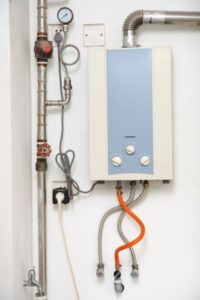Once your water heater starts to go, the clock is ticking. If it isn’t working properly and you’ve been taking cold showers, or if it’s starting to rust or leak, it’s only a matter of time before you’ve got a very big problem on your hands. Water damage is no joke! So you’d better get to work on deciding which kind of water heater you want to replace it with.
Tank water heaters are the more traditional option, which you’re probably familiar with. Tankless systems offer some different advantages. And then there are heat pump water heaters. Which is the right choice for you? Here’s some useful information.
There are several different factors that you will be weighing in the process of making this decision. Which one you prioritize the most is up to you, but we can tell you which type of system has an advantage in each area.
Short-Term Capacity
What we mean by this is how much hot water you can get all at once. Here’s where a tank system shines: You can have as much as you want! Well… until the tank’s capacity is used up. This might be ideal if you have a large family on a tight schedule. If you all get home from work and sports at 6 pm and people are showering in all the bathrooms while the laundry is running, you need a lot of hot water at once.
A tank system could use natural gas or electricity to heat the water, or it could be a heat pump system. Do keep in mind, though, that a heat pump water heater will take a bit more time to heat that full tank up again after your family has used all the hot water.
Long-Term Capacity
While a tankless system can only produce 2-5 gallons of hot water per minute, it can do that every minute of every day, all year round! With this type of system, while you won’t want to have every hot tap in the house running at once, you can have hot water for as long as you need it.
This might work better for a household with someone home all the time, with more frequent but less intense need for hot water, or for a smaller household.
Up-Front Cost
This is the price tag of the system as well as the cost of installation, and it varies a great deal depending on the exact make and model. In general, a traditional tank water heater will be the least expensive option, while the others are more costly.
Don’t forget to consider the costs of any modifications necessary for installation! Tankless systems may require plumbing modifications, and switching from electric to gas can lead to additional work.
Operational Cost
The answer here, again, is clear-cut. While a tankless system will use less energy and thus cost less to run than a traditional tank storage system, a heat pump water heater will use even less energy and cost even less to run.
Longevity
The final thing to consider is how long the system will last. Estimates are not absolutely precise, and do keep in mind that they’re based on systems that receive regular maintenance, which helps them last longer.
A tank water heater will generally run for 8-12 years. A heat pump water heater will last a bit longer, perhaps 13-15 years. And a tankless system is the winner in this category, potentially running for 20 years.
If you need help deciding which factor you should weigh most heavily or you’d like more detailed information as you choose between a heat pump water heater vs. tankless system in Livingston, NJ, we’re ready to assist you.
Contact MarGo Plumbing Heating Cooling Inc. today with your questions about water heaters!

